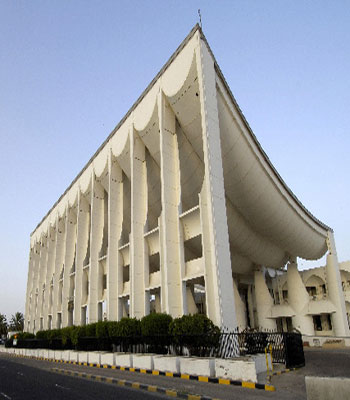
Kuwait’s Parliament building (R)
KUWAIT CITY, Kuwait, AP -Kuwait’s ruler dissolved parliament Sunday and called early elections amid a dispute between the government and lawmakers over electoral reform.
Sheik Sabah Al Ahmed Al Sabah ordered parliamentary elections held June 29. They originally were scheduled for summer 2007.
The emir’s move was the latest example of the stormy relationship between Kuwait’s parliament and ruling family as it tries to respond to demands for greater democracy.
Sunday’s move was the fourth time an emir dissolved parliament since it was created in 1963 — at times leaving the country without a legislature for years. Each of the previous times, dissolution has come after lawmakers became too critical in attempts to remove government ministers.
The constitution requires that elections be held within two months of dissolving parliament — a rule that was followed in 1999 and which the emir’s announcement Sunday aims to uphold. But it was more than four years before elections were held after parliament was disbanded in 1979 and more than six after it was dissolved in 1986.
Parliament, where Islamists and conservative tribal lawmakers hold considerable influence, also has resisted the ruling family on some major pieces of legislation. For example, for years they held up laws giving women the right to vote, although the emir refrained from dissolving the body and eventually pushed the bill through last year.
Kuwait is a staunch ally of the United States and has hosted U.S. troops since they liberated it from a brief occupation by Iraq during the Gulf War in 1991.
In recent weeks, lawmakers had been at odds with the Cabinet — which is led by a ruling family member — over a draft law for electoral reform. The government-proposed bill aimed to reduce the number of electoral constituencies from 25 to 10, but parliamentarians say the number should be reduced to five to combat vote buying.
On Sunday, the emir said in a brief televised address that the “charged” public arguments over electoral reform have become “a threat to the security and stability of the country” and have weakened national unity.
“This is why I had to make a difficult decision, a decision I did not want to make. I believe it was my responsibility to take a decision to dissolve parliament according to the constitution to maintain the security of our country and the safety of its people,” he said.
Sheik Sabah said the period ahead of the elections will “give us time to calm down and to think of what is in the interest of our country in the present and the future.”
Early elections are expected to be held under the current 25-district system.
On Wednesday, three lawmakers submitted a request to parliament seeking to pose questions to the prime minister, Sheik Nasser Al Mohammed Al Sabah, on the draft law.
Opponents of the bill are numerous — in parliament and among the public.
Twenty-nine of parliament’s 50 members opposed the draft law.
Hundreds of young Kuwaiti men and women have rallied for a five-constituency system, and dozens of demonstrations attended by thousands featured heated debates and cutting criticism of the Cabinet.
When the disputed reform bill was introduced Monday, the speaker suspended the session after rowdy, pro-reform spectators heckled lawmakers, and opposition parliamentarians stormed out.
The ruling Al Sabah family holds key posts in the Cabinet, including oil, defense, interior and foreign affairs.

The emblem of Kuwait’s national assembly is seen at the gate of the Parliament building in Kuwait City (AFP)

Sheikh Sabah al-Ahmad al-Sabah (AFP)
